Please fill out the following information, and RRFC Admissions will contact you to discuss our program offerings:
Issue #179
by L. Swift and Jeff McQ
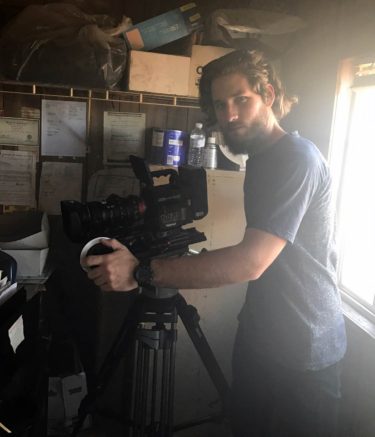 Caleb Dixon’s (Nashville, TN) first interest in film came as a 10-year old kid, playing with his parent’s old video camera—a practice which he says got him in a bit of trouble.
“I just started filming stuff,” he says. “Unbeknownst to me I was probably filming over a lot of old family events and reunions and such. So my parents started to get down my throat for that, obviously. But I would start making little home movies and skits, and I just really enjoyed it, editing and just figuring out different kinds of effects I could do and other fun things.”
A few years later, his interest in the camera was rekindled by his oldest brother, a broadcast journalist in the army.
“They sent him all over Europe, so he got to travel and shoot stuff,” says Caleb. “He’s always wanted to be a journalist, and then cameras just kind of came along with that…I was like, man, I kind of always wanted to film stuff too. So maybe this could be something I could get into. So maybe four or five years ago, when I was 15, I bought my first DSLR camera and started making little short videos.”
Despite Caleb’s interest in film, the idea of more schooling after high school didn’t appeal to him. “I was never super interested in school,” he admits. “I love learning. My whole personality type is just learning things…but school just wasn’t quite my speed…I didn’t want to go to college.”
Even while scoping out film schools in Nashville, Caleb says he was on the fence about the whole thing. “Everything just felt too class-oriented for me,” he says. “I just wanted a mentorship, I wanted something that was always hands-on, and also a little bit more affordable.”
When Caleb discovered the Film Connection could give him exactly the type of mentorship he wanted in his own home town, he was hooked. He remembers meeting up for the first time at a local Starbucks with Film Connection mentor Zac Adams of Skydive Films.
“He has a binder in his hands…he just came right off of a shoot to meet me,” says Caleb. So it was cool just to see, like this isn’t just like some mentor who knows something about the film industry. This guy is currently working on films, he’s invested, he’s taking time out of his day from a shoot to come and help me…It was really cool just to kind of hear his experiences of all the things that he gets to bring his apprentices on. He was telling me some of the places that he’s taken some of his past students and some of the celebrities that he’s worked with in the last couple years, and really what sold me was him telling me all the shoots that he has coming up…I wanted to jump in as quickly as possible.”
Caleb Dixon’s (Nashville, TN) first interest in film came as a 10-year old kid, playing with his parent’s old video camera—a practice which he says got him in a bit of trouble.
“I just started filming stuff,” he says. “Unbeknownst to me I was probably filming over a lot of old family events and reunions and such. So my parents started to get down my throat for that, obviously. But I would start making little home movies and skits, and I just really enjoyed it, editing and just figuring out different kinds of effects I could do and other fun things.”
A few years later, his interest in the camera was rekindled by his oldest brother, a broadcast journalist in the army.
“They sent him all over Europe, so he got to travel and shoot stuff,” says Caleb. “He’s always wanted to be a journalist, and then cameras just kind of came along with that…I was like, man, I kind of always wanted to film stuff too. So maybe this could be something I could get into. So maybe four or five years ago, when I was 15, I bought my first DSLR camera and started making little short videos.”
Despite Caleb’s interest in film, the idea of more schooling after high school didn’t appeal to him. “I was never super interested in school,” he admits. “I love learning. My whole personality type is just learning things…but school just wasn’t quite my speed…I didn’t want to go to college.”
Even while scoping out film schools in Nashville, Caleb says he was on the fence about the whole thing. “Everything just felt too class-oriented for me,” he says. “I just wanted a mentorship, I wanted something that was always hands-on, and also a little bit more affordable.”
When Caleb discovered the Film Connection could give him exactly the type of mentorship he wanted in his own home town, he was hooked. He remembers meeting up for the first time at a local Starbucks with Film Connection mentor Zac Adams of Skydive Films.
“He has a binder in his hands…he just came right off of a shoot to meet me,” says Caleb. So it was cool just to see, like this isn’t just like some mentor who knows something about the film industry. This guy is currently working on films, he’s invested, he’s taking time out of his day from a shoot to come and help me…It was really cool just to kind of hear his experiences of all the things that he gets to bring his apprentices on. He was telling me some of the places that he’s taken some of his past students and some of the celebrities that he’s worked with in the last couple years, and really what sold me was him telling me all the shoots that he has coming up…I wanted to jump in as quickly as possible.”
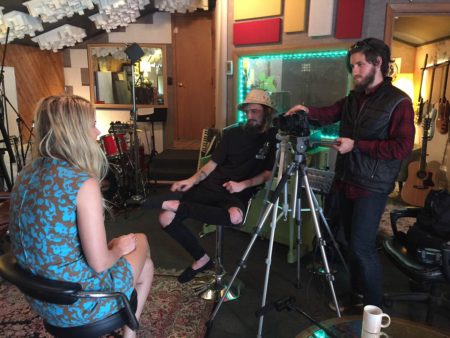
Brandon Russell (seated) and Caleb Dixon, Morgan Clark EPK
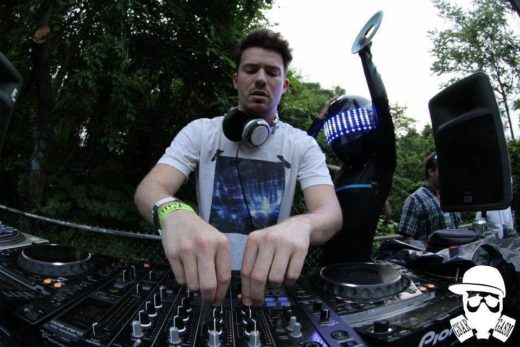 RRFC: So can you start with a bit of your backstory? How did you get into music and DJing?
Joey Paranoia: I kind of did the non-traditional route. My parents did make me take music lessons, although I wasn’t too fond of the teacher I had. It was very regimented and kind of boring, and I would make up abstract pieces of music or be all excited about things, and they were like, “No, this is not the right way to do it. You need to be structured.” So…I left it and kind of just wasn’t really into it, and got really into film. I really started to like editing and putting music to visuals. So I needed to be able to mix music to the films I was making, and that’s really where I kind of got the bug again for music. I was maybe 15 or 16 years old, in about 10th grade in high school. That kind of led me to mixing music analog, on cassettes, being able to blend things together. This was in the 90’s…I started seeing these machines and got really into it. I thought the artform was really cool. It was very experimental, which I liked. So that was the base foundation of what turned into my career later as a professional performing musician DJ.
RRFC: What was your music scene like back then?
Joey: It was all kinds of different experimental groups. It was like people on turntables, a guitar player, singer, people doing live vocal samples and loops with analog recordings and tapes and being able to use all kinds of weird, trippy effects. So it was a very kind of freeform style, and my roots were in DJ’ing. I started DJ’ing records, and I was mostly into electronic music, and when I moved out of my parents’ house after high school, my first roommate was a hip hop DJ. So it was kind of like the two meeting of the minds of, “Look what I can do with my records,” “Well, look what I can do with mine.” So we were doing scratching and beat matching, and then that led onto getting our own drum machines, keyboards…The genres and trends were kind of coming and going in waves, and we would kind of hop on one and take a little bit of this one and that one. We were always kind of coming back to using digital, like computers and machines on with analog equipment and making kind of a jam out of it.
RRFC: At what point did Ableton come into the picture for you?
Joey: It was probably 2004, 2005, 2006, something like that where everyone was able to get a computer, to get a program, and to record their own music at home. It was becoming affordable for everyone, I had a bunch of analog equipment, a bunch of turntables and records and things, and I really just needed a program, a software, to record my sets into. I went through a bunch of different options, but Ableton appealed to me visually. It was colorful, it was an easy interface, and I just saw one of my heroes using it on stage, and I was like, “Well, I think I’m sold. That’s the one for me.” So I purchased Ableton and started to record analog gear and sets in Ableton. That was kind of the first wave of using it, which evolved into, wow, “you can actually cut the information up and trigger it live and do a bunch of things you could never even dream of with analog gear or turntables.” So it was kind of the best of both worlds, and it really fit the evolution of where I was going musically.
RRFC: Do you by working with Ableton the way you were, that this sort of harkened back to you when you were a kid having those elemental creative urges, wanting to do this freeform abstract stuff but your instructors were telling you “No”?
Joey: Yeah, very much so. There were no rules and no limitations. It was just whatever you could come up with creatively, you could really put it down, and it would be kind of manifested right in front of you instantly, whereas it would be almost near impossible to do with analog gear.
RRFC: So do you geek out on actual sounds themselves? Like capturing stuff and recording it? Are you creating your own samples? What is it that’s going on with you at that level?
Joey: Yeah, I am definitely kind of a nerd when it comes to field recordings. I definitely like real-life situations. I think that gives it a more human touch. So I try to field record, which is just sampling real life, whether it’s birds and nature or people talking or just abstract sounds in general, and then putting them into Ableton and manipulating them through effects or sequencing different things. And that goes along with having everything in stock. When you buy a program, everyone is going to have sample packs with some drum kits and different BST’s and instruments. Putting the field recordings along with that gives it a nice balance and a certain feel.
RRFC: So can you start with a bit of your backstory? How did you get into music and DJing?
Joey Paranoia: I kind of did the non-traditional route. My parents did make me take music lessons, although I wasn’t too fond of the teacher I had. It was very regimented and kind of boring, and I would make up abstract pieces of music or be all excited about things, and they were like, “No, this is not the right way to do it. You need to be structured.” So…I left it and kind of just wasn’t really into it, and got really into film. I really started to like editing and putting music to visuals. So I needed to be able to mix music to the films I was making, and that’s really where I kind of got the bug again for music. I was maybe 15 or 16 years old, in about 10th grade in high school. That kind of led me to mixing music analog, on cassettes, being able to blend things together. This was in the 90’s…I started seeing these machines and got really into it. I thought the artform was really cool. It was very experimental, which I liked. So that was the base foundation of what turned into my career later as a professional performing musician DJ.
RRFC: What was your music scene like back then?
Joey: It was all kinds of different experimental groups. It was like people on turntables, a guitar player, singer, people doing live vocal samples and loops with analog recordings and tapes and being able to use all kinds of weird, trippy effects. So it was a very kind of freeform style, and my roots were in DJ’ing. I started DJ’ing records, and I was mostly into electronic music, and when I moved out of my parents’ house after high school, my first roommate was a hip hop DJ. So it was kind of like the two meeting of the minds of, “Look what I can do with my records,” “Well, look what I can do with mine.” So we were doing scratching and beat matching, and then that led onto getting our own drum machines, keyboards…The genres and trends were kind of coming and going in waves, and we would kind of hop on one and take a little bit of this one and that one. We were always kind of coming back to using digital, like computers and machines on with analog equipment and making kind of a jam out of it.
RRFC: At what point did Ableton come into the picture for you?
Joey: It was probably 2004, 2005, 2006, something like that where everyone was able to get a computer, to get a program, and to record their own music at home. It was becoming affordable for everyone, I had a bunch of analog equipment, a bunch of turntables and records and things, and I really just needed a program, a software, to record my sets into. I went through a bunch of different options, but Ableton appealed to me visually. It was colorful, it was an easy interface, and I just saw one of my heroes using it on stage, and I was like, “Well, I think I’m sold. That’s the one for me.” So I purchased Ableton and started to record analog gear and sets in Ableton. That was kind of the first wave of using it, which evolved into, wow, “you can actually cut the information up and trigger it live and do a bunch of things you could never even dream of with analog gear or turntables.” So it was kind of the best of both worlds, and it really fit the evolution of where I was going musically.
RRFC: Do you by working with Ableton the way you were, that this sort of harkened back to you when you were a kid having those elemental creative urges, wanting to do this freeform abstract stuff but your instructors were telling you “No”?
Joey: Yeah, very much so. There were no rules and no limitations. It was just whatever you could come up with creatively, you could really put it down, and it would be kind of manifested right in front of you instantly, whereas it would be almost near impossible to do with analog gear.
RRFC: So do you geek out on actual sounds themselves? Like capturing stuff and recording it? Are you creating your own samples? What is it that’s going on with you at that level?
Joey: Yeah, I am definitely kind of a nerd when it comes to field recordings. I definitely like real-life situations. I think that gives it a more human touch. So I try to field record, which is just sampling real life, whether it’s birds and nature or people talking or just abstract sounds in general, and then putting them into Ableton and manipulating them through effects or sequencing different things. And that goes along with having everything in stock. When you buy a program, everyone is going to have sample packs with some drum kits and different BST’s and instruments. Putting the field recordings along with that gives it a nice balance and a certain feel.
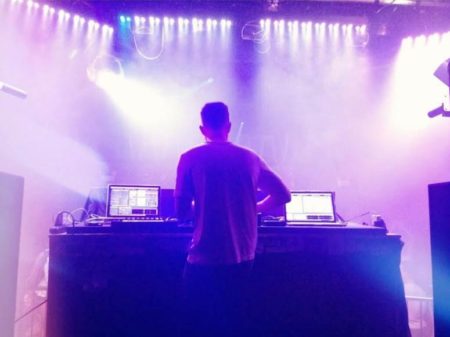 RRFC: Can you tell us a bit about the DJing aspect of your career? What turns you on about it?
Joey: DJing is really the root and foundation for me. I didn’t come from a musician background. I really got into music just by mixing weird sounds and weird music together…I always liked how things could be seamless with a DJ set, where things weren’t starting and then stopping. So with DJ’ing it’s really a feeling, and I think whether you’re DJ’ing house or hip hop or just blending music together, it’s setting the mood and the atmosphere for the situation that you’re in, and if you can really kind of tune into that and match it with what the people are feeling, obviously if it’s a big, crowded warehouse and they’re all dancing, you’re going to play the music that’s going to fit that. Or if it’s a chill environment, you kind of want to gauge it to that. That’s what makes a good DJ, and that’s what I try to pride myself on. I don’t discriminate against different genres. I think everything has its place. I mean I could be playing to a huge festival or to a little dive bar crowd playing old rock music. I’m into it, you know? I just try to make it cool and use the artform and have a good time and make people hear music that maybe they wouldn’t be exposed to otherwise.
RRFC: So what got you into teaching Ableton?
Joey: It’s funny because I never thought of myself as a good teacher or thought I would be teaching professionally…I never really liked the atmosphere of school…I would make YouTube tutorials on Ableton and different drum machines back when YouTube started, and Ableton actually contacted me directly and they were like, “Hey, we’ve seen your videos on YouTube. We’d like to invite you out to test among some of the other people and see if you want to become an Ableton certified trainer…I didn’t really think much of it at the time, but I went out there, I got my certification…I was probably the youngest kid there and I was doing things that they had never really seen before…It just kind of spiraled out of control when I started teaching…My heroes growing up were hitting me up to get some Ableton insight…So I guess it was by chance, but it’s worked out very well, and my approach to teaching and training, I really try to relate to each individual person. I try to see where they’re at, what level they’re at, what they want to do with it, and go from there. I don’t teach a kind of A-Z type course. I really try to get in tune with the individual, because everybody’s different. Everybody’s using it differently and everyone wants to have a different end goal and result.
RRFC: So what’s it like to teach your heroes? That must be a crazy experience.
Joey: It was definitely one of the highlights of my music career in general, being able to, one, help out someone who blew my mind as kid and inspired me and is still inspiring me, and just to meet them on their level and to be able to work with them. It’s kind of like joining your childhood band or something like that to really see the insides of how they’re doing things and becoming friends with them. So it was great. It was a humbling experience but a very motivating and satisfying one as well.
RRFC: That’s a very good takeaway for anyone working in audio or music—we’re always teaching each other something. You’re always learning, no matter what level you’re at.
Joey: Right, very much so. The students, I tell them I’m learning as a teacher as well. So the more I teach and the more people I teach, the better teacher I become…I just try to stay really focused and aware of that.
RRFC: Can you tell us a bit about the DJing aspect of your career? What turns you on about it?
Joey: DJing is really the root and foundation for me. I didn’t come from a musician background. I really got into music just by mixing weird sounds and weird music together…I always liked how things could be seamless with a DJ set, where things weren’t starting and then stopping. So with DJ’ing it’s really a feeling, and I think whether you’re DJ’ing house or hip hop or just blending music together, it’s setting the mood and the atmosphere for the situation that you’re in, and if you can really kind of tune into that and match it with what the people are feeling, obviously if it’s a big, crowded warehouse and they’re all dancing, you’re going to play the music that’s going to fit that. Or if it’s a chill environment, you kind of want to gauge it to that. That’s what makes a good DJ, and that’s what I try to pride myself on. I don’t discriminate against different genres. I think everything has its place. I mean I could be playing to a huge festival or to a little dive bar crowd playing old rock music. I’m into it, you know? I just try to make it cool and use the artform and have a good time and make people hear music that maybe they wouldn’t be exposed to otherwise.
RRFC: So what got you into teaching Ableton?
Joey: It’s funny because I never thought of myself as a good teacher or thought I would be teaching professionally…I never really liked the atmosphere of school…I would make YouTube tutorials on Ableton and different drum machines back when YouTube started, and Ableton actually contacted me directly and they were like, “Hey, we’ve seen your videos on YouTube. We’d like to invite you out to test among some of the other people and see if you want to become an Ableton certified trainer…I didn’t really think much of it at the time, but I went out there, I got my certification…I was probably the youngest kid there and I was doing things that they had never really seen before…It just kind of spiraled out of control when I started teaching…My heroes growing up were hitting me up to get some Ableton insight…So I guess it was by chance, but it’s worked out very well, and my approach to teaching and training, I really try to relate to each individual person. I try to see where they’re at, what level they’re at, what they want to do with it, and go from there. I don’t teach a kind of A-Z type course. I really try to get in tune with the individual, because everybody’s different. Everybody’s using it differently and everyone wants to have a different end goal and result.
RRFC: So what’s it like to teach your heroes? That must be a crazy experience.
Joey: It was definitely one of the highlights of my music career in general, being able to, one, help out someone who blew my mind as kid and inspired me and is still inspiring me, and just to meet them on their level and to be able to work with them. It’s kind of like joining your childhood band or something like that to really see the insides of how they’re doing things and becoming friends with them. So it was great. It was a humbling experience but a very motivating and satisfying one as well.
RRFC: That’s a very good takeaway for anyone working in audio or music—we’re always teaching each other something. You’re always learning, no matter what level you’re at.
Joey: Right, very much so. The students, I tell them I’m learning as a teacher as well. So the more I teach and the more people I teach, the better teacher I become…I just try to stay really focused and aware of that.
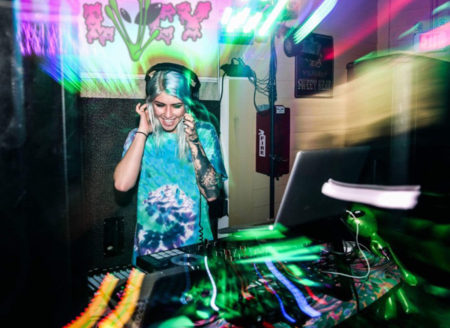
RC apprentice Emily Stamer
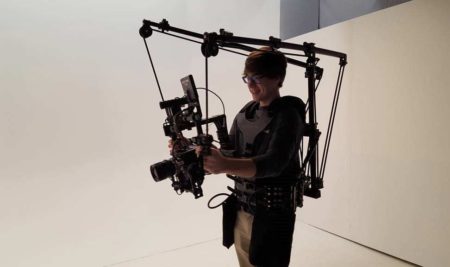 Film Connection student Jason Reinhardt (Atlanta, GA) is excited about his future but feeling a little bittersweet about his studies coming to an end: “I’m sad to say we completed the last chapter of the book today. The course is coming to an end, but not my career. After everything, I feel far more comfortable and ready to enter the film industry. I was given the opportunity to work with Steve Carmichael, my mentor, as Camera Assistant and P.A. for multiple shoots on a documentary…Steve helped me in my search to buy a camera, and let me borrow some of his own personal equipment to use until I was able to get it myself. Now, near the end of the course, he’s introducing me to clients, crew and employees of Rite Media Group, where he has his office. Learning and working with Steve has been a phenomenal experience and one of a kind. Thanks Film Connection.”
Film Connection student Jason Reinhardt (Atlanta, GA) is excited about his future but feeling a little bittersweet about his studies coming to an end: “I’m sad to say we completed the last chapter of the book today. The course is coming to an end, but not my career. After everything, I feel far more comfortable and ready to enter the film industry. I was given the opportunity to work with Steve Carmichael, my mentor, as Camera Assistant and P.A. for multiple shoots on a documentary…Steve helped me in my search to buy a camera, and let me borrow some of his own personal equipment to use until I was able to get it myself. Now, near the end of the course, he’s introducing me to clients, crew and employees of Rite Media Group, where he has his office. Learning and working with Steve has been a phenomenal experience and one of a kind. Thanks Film Connection.”
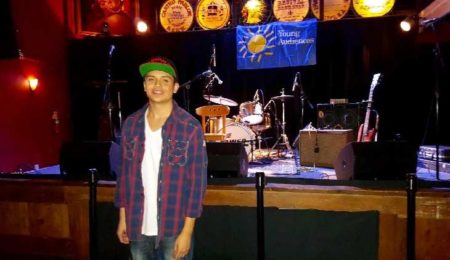 Recording Connection student Joshua M. Phady Frost Jr. (Portland, OR) who apprentices with mentor Matt Jefferson at Black Diamond Recording Studios, recently had the opportunity to tackle the live sound setup at a local event. Having graduated high school just a few months ago, Frosty is pursuing his goal of being an independent artist, and says, “I’m just doing all the experiences I need to reach my dream, and I think Record Connection could help get the dream I always wanted to do.”
Recording Connection student Joshua M. Phady Frost Jr. (Portland, OR) who apprentices with mentor Matt Jefferson at Black Diamond Recording Studios, recently had the opportunity to tackle the live sound setup at a local event. Having graduated high school just a few months ago, Frosty is pursuing his goal of being an independent artist, and says, “I’m just doing all the experiences I need to reach my dream, and I think Record Connection could help get the dream I always wanted to do.”

RRFC is education upgraded for the 21st century.
Get the latest career advice, insider production tips, and more!
Please fill out the following information, and RRFC Admissions will contact you to discuss our program offerings:
Stay in the Loop: Subscribe for RRFC news & updates!
© 2025 Recording Radio Film Connection & CASA Schools. All Rights Reserved.


